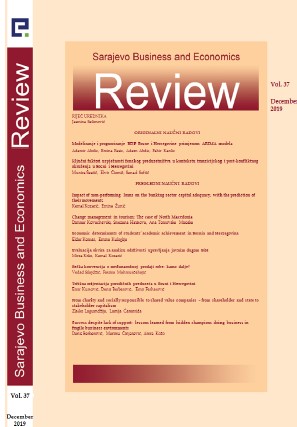DETERMINANTS OF SUCCESS OF STUDYING AT THE SCHOOL OF ECONOMICS AND BUSINESS, UNIVERSITY OF SARAJEVO
DETERMINANTS OF SUCCESS OF STUDYING AT THE SCHOOL OF ECONOMICS AND BUSINESS, UNIVERSITY OF SARAJEVO
Author(s): Ajla ŠušićSubject(s): Higher Education , Personality Psychology, Demography and human biology, Socio-Economic Research, Sociology of Education
Published by: Ekonomski fakultet u Sarajevu
Keywords: socioeconomic and demographic factors; regression analysis; summary statistics;
Summary/Abstract: Academic education has been recognized by more young people as a logical step in the path of professional career development. During this educational process, commitment and work of each individual result in some success. The purpose of this survey is to examine the influence of some socioeconomic and demographic variables on students’ success during the study. Achievement during the education is usually followed by an average grade which is primarly the assessment of student’s knowledge and secondly the assessment of student’s continuous work and effort. The data analysis will be done on primary data basis, collected by interviewing students of the School of Economics and Business at the University of Sarajevo. The survey was distributed online and collected data for 210 students, of which 63 were male and 147 were female students. Students’ success is defined as the average grade in the previous study and is a dependent variable in our model. The independent variables in the model are: the percentage of student’s attendance at lectures and tutorials, physical activity, years of study, department, the way of learning, level of education, level of parents’ education, way of financing the study, the place of stay during the studies, the high school grade and the entity where the students came from. Since the goal of the research is to examine the dependence between variables and that one dependent variable and a set of independent variables have been identified, the method of dependence or multiple regression analysis has been used for the analysis. In this paper we tried to find out how regularly attendance, study methods, department, gender, years of study, level of parents’ education, way of financing the study, and other factors selected on the basis of theory affect the success of the studies. In particular, for this research, in addition to theoretical expectations, the values of the parameters are also interpreted from the point of view of the everyday situation. The results of the survey confirmed some of the hypothesis. We have obtained a model where the estimated values are the actual picture of the population, because the model is the best efficient impartial estimator. More precisely, our model proves that variables such as attendance, department, method of study, physical activity, level of parents’ education, way of financing the study, the place of stay during study, way of learning scheduling affect the average grade during study. A variable such as gender was not significant in estimated model, however, using a non-parametric test, we have shown that there is a significant difference in the average grade between female and male students.
Journal: Zbornik radova - Sarajevo Business and Economics Review (SBER)
- Issue Year: 2020
- Issue No: 38
- Page Range: 249-262
- Page Count: 14
- Language: English

